Related Research Articles

Paul Laurence Dunbar was an American poet, novelist, and short story writer of the late 19th and early 20th centuries. Born in Dayton, Ohio, to parents who had been enslaved in Kentucky before the American Civil War, Dunbar began writing stories and verse when he was a child. He published his first poems at the age of 16 in a Dayton newspaper, and served as president of his high school's literary society.

Thomas Stearns Eliot was a poet, essayist, publisher, playwright, literary critic and editor. Considered one of the 20th century's major poets, he is a central figure in English-language Modernist poetry. Through his trials in language, writing style, and verse structure, he reinvigorated English poetry. He also dismantled outdated beliefs and established new ones through a collection of critical essays.

Walter Whitman Jr. was an American poet, essayist, and journalist. He is considered one of the most influential poets in American history. Whitman incorporated both transcendentalism and realism in his writings and is often called the father of free verse. His work was controversial in his time, particularly his 1855 poetry collection Leaves of Grass, which was described by some as obscene for its overt sensuality.

William Carlos Williams was an American poet, writer, and physician closely associated with modernism and imagism.
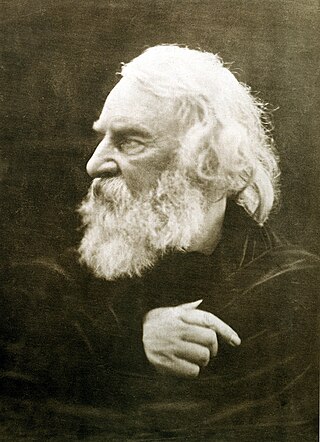
Henry Wadsworth Longfellow was an American poet and educator. His original works include the poems "Paul Revere's Ride", "The Song of Hiawatha", and "Evangeline". He was the first American to completely translate Dante Alighieri's Divine Comedy and was one of the fireside poets from New England.

Matthew Arnold was an English poet and cultural critic who worked as an inspector of schools. He was the son of Thomas Arnold, the celebrated headmaster of Rugby School, and brother to both Tom Arnold, literary professor, and William Delafield Arnold, novelist and colonial administrator. Matthew Arnold has been characterised as a sage writer, a type of writer who chastises and instructs the reader on contemporary social issues. He was also an inspector of schools for thirty-five years, and supported the concept of state-regulated secondary education.

Macon is a city in Noxubee County, Mississippi along the Noxubee River. The population was 2,768 at the 2010 census. It is the county seat of Noxubee County.

Sidney Clopton Lanier was an American musician, poet and author. He served in the Confederate States Army as a private, worked on a blockade-running ship for which he was imprisoned, taught, worked at a hotel where he gave musical performances, was a church organist, and worked as a lawyer. As a poet he sometimes used dialects. Many of his poems are written in heightened, but often archaic, American English. He became a flautist and sold poems to publications. He eventually became a professor of literature at Johns Hopkins University in Baltimore, and is known for his adaptation of musical meter to poetry. Many schools, other structures and two lakes are named for him, and he became hailed in the South as the "poet of the Confederacy". A 1972 US postage stamp honored him as an "American poet".

Pinckney Benton Stewart Pinchback was an American publisher, politician, and Union Army officer. Pinchback was the second African American to serve as governor and lieutenant governor of a U.S. state. A Republican, Pinchback served as acting governor of Louisiana from December 9, 1872, to January 13, 1873. He was one of the most prominent African-American officeholders during the Reconstruction Era.
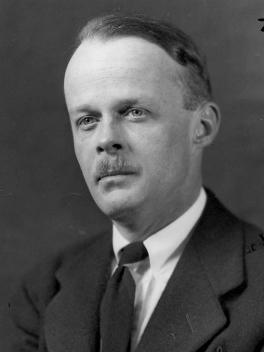
John Orley Allen Tate, known professionally as Allen Tate, was an American poet, essayist, social commentator, and poet laureate from 1943 to 1944.

Carl Rakosi was the last surviving member of the original group of poets who were given the rubric Objectivist. He was still publishing and performing his poetry well into his 90s.

Sir Charles George Douglas Roberts was a Canadian poet and prose writer. He was one of the first Canadian authors to be internationally known. He published various works on Canadian exploration and natural history, verse, travel books, and fiction." He continued to be a well-known "man of letters" until his death.
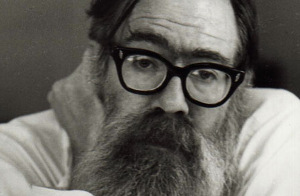
John Allyn McAlpin Berryman was an American poet and scholar. He was a major figure in American poetry in the second half of the 20th century and is considered a key figure in the "confessional" school of poetry. His best-known work is The Dream Songs.

Nathan Haskell Dole was an American editor, translator, and author. A writer and journalist in Philadelphia, New York, and Boston, he translated many of the works of Leo Tolstoy and books of other Russians; novels of the Spaniard Armando Palacio Valdés (1886–90); a variety of works from the French and Italian.

Rob Morris was a prominent American poet and Freemason. He also created the first ritual for what was to become the Order of the Eastern Star.

Mabel Loomis Todd or Mabel Loomis was an American editor and writer. She is remembered as the editor of posthumously published editions of Emily Dickinson's poetry and letters and also wrote several novels and books about her travels with her husband, astronomer David Peck Todd, as well as co-authoring a textbook on astronomy.
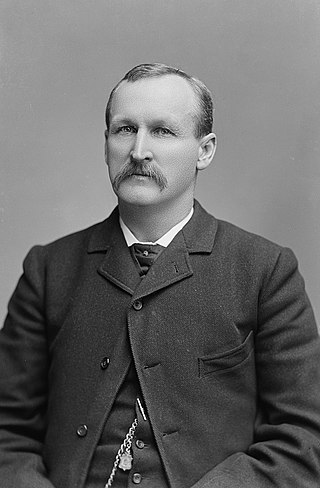
Clarke Lewis was an American educator, Civil War veteran, and politician who served two terms as a United States representative from Mississippi from 1889 to 1893.
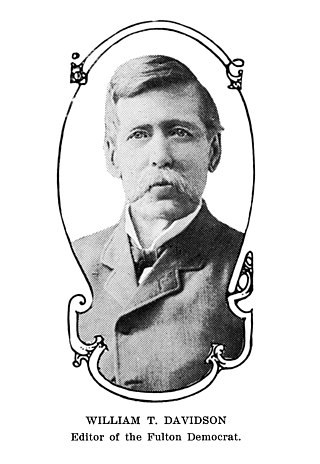
William Taylor Davidson was the owner and editor of the Fulton Democrat newspaper from 1858 to 1915. He was a staunch supporter of Stephen A. Douglas and a strong advocate for the views of the Peace Democrats or Copperheads during the American Civil War.

For the American entertainment lawyer, see Irwin Russell.

Francis Orray Ticknor was an American doctor and poet. From the state of Georgia, he became known as a war poet, mostly through the fame he acquired with the ballad "Little Giffen".
References
- ↑ The Mississippi Poets. E. H. Clarke & brothers. 1922.
- ↑ Lipscomb, Dabney (1899). William Ward, a Mississippi Poet Entitled to Distinction.
- ↑ Society (Founded 1890), Mississippi Historical (May 4, 1898). "Publications of the Mississippi Historical Society". The Society – via Google Books.